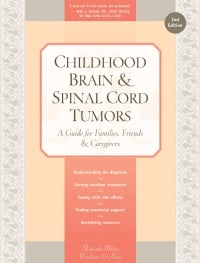Childhood Brain and Spinal Cord Tumors
Guidelines for calling the doctor
Sometimes parents are reluctant to call their child’s neuro-oncologist with questions or concerns, so here are some general guidelines about when you should call:
- A temperature above 101° F (38.5° C)
- Shaking or chills
- Shortness of breath
- Severe nausea or vomiting
- Unusual bleeding, bruising, or cuts that won’t heal
- Pain or swelling at a chemotherapy injection site
- Any severe pain that cannot be explained
- Exposure to chicken pox or measles
- Severe headache or blurred vision
- Constipation lasting more than 2 days
- Severe diarrhea
- Severe headaches
- Painful urination or bowel movements
- Blood in urine
Parents should not hesitate to bring their children to the hospital if they are ill and their blood counts are low, as this can be a life-threatening emergency. Any time your child is sick and you are concerned, call the doctor.
Table of Contents
All Guides- Introduction
- 1. Diagnosis
- 2. The Brain and Spinal Cord
- 3. Types of Tumors
- 4. Telling Your Child and Others
- 5. Choosing a Treatment
- 6. Coping with Procedures
- 7. Forming a Partnership with the Treatment Team
- 8. Hospitalization
- 9. Venous Catheters
- 10. Surgery
- 11. Chemotherapy
- 12. Common Side Effects of Chemotherapy
- 13. Radiation Therapy
- 14. Peripheral Blood Stem Cell Transplantation
- 15. Siblings
- 16. Family and Friends
- 17. Communication and Behavior
- 18. School
- 19. Sources of Support
- 20. Nutrition
- 21. Medical and Financial Record-keeping
- 22. End of Treatment and Beyond
- 23. Recurrence
- 24. Death and Bereavement
- 25. Looking Forward
- Appendix A. Blood Tests and What They Mean
- Appendix C. Books and Websites

